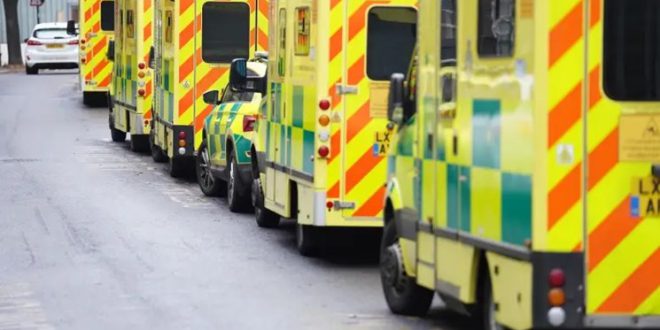Up to 25,000 ambulance workers across England and Wales went on strike in a dispute with the Government over pay.
Paramedics, call handlers, drivers and technicians from the Unison and GMB unions are taking part in staggered strikes across a 24-hour period, The Independent reported.
It comes as 14 health unions, representing more than a million NHS staff, said they will not submit evidence to the NHS pay review body for the next wage round “while the current industrial disputes remain unresolved”.
Instead, the unions, which represent ambulance staff, nurses, porters, healthcare assistants, physiotherapists and other NHS workers in England, called for direct pay talks with ministers.
Unison has balloted around 15,000 of its members who are striking in London, Yorkshire, the North West, North East and South West.
More than 10,000 GMB ambulance workers are also walking out, with their ambulance services covering the South West, South East coast, North West, South central area, North East, East Midlands, West Midlands, Yorkshire and Wales.
NHS England has told patients to continue to call 999 for life-threatening emergencies but to use 111, GPs and pharmacies for non-urgent needs.
It said some people may be asked to make their own way to hospital, though it urged people to seek medical advice from 111 or 999 before doing so.
Speaking on Sky News, Health Secretary Steve Barclay was asked whether he agreed with comments by Business Secretary Grant Shapps that striking paramedics were being “reckless”.
Barclay said, “If there are delays to ambulances, then it is concerning in terms of our ability to get that care.”
“It is clearly a concern as to the impact it has on patient safety,” he added.
Asked about pay talks to break the current deadlock, Barclay said he does not “think it is right” to “retrospectively” go back to April when it comes to reviewing this year’s pay offer to NHS staff.
It comes amid reports he is considering backdating any 2023/24 pay rise, due to be finalised in the spring, to this month in order to boost the current year’s settlement offer.
Asked on BBC Radio 4’s Today programme if he is considering “reopening” the current year’s negotiations, Barclay said, “The purpose of the meeting on Monday was to look at this coming year’s pay review body and the evidence going in.”
“But, of course, it was an opportunity to listen to the trade unions in terms of their points on last year’s settlement,” he added.
“I don’t think it is right to go all the way back to April and retrospectively look at April when we’re already under way in terms of this year’s pay review body,” he said.
“But, of course, the unions made representations about that and what the Prime Minister [Rishi Sunak] said at the weekend is nothing is off the table,” he added.
Barclay also urged people to use their “common sense” regarding what activities they do during a strike.
Ambulance responses are split into categories, with category 1 being the most life-threatening such as cardiac arrest, while category 2 covers conditions such as stroke, heart attack and sepsis.
No blanket agreement has been reached on responding to category 2 calls, with unions and trusts agreeing locally which category 2 calls will receive a response during the strike.
Barclay condemned unions for failing to agree national minimum safety levels during strikes – something that would be fixed by legislation presented to Parliament on Tuesday.
Unison’s Christina McAnea told BBC Radio 4’s Today programme the Government was only willing to commit to safe staffing in the NHS when there was a strike.
She said, “I find it quite appalling that at a time when we’ve been calling for safe staffing levels in the NHS, it seems that the only time the country will get safe staffing levels, if the Government bring this legislation in, is when we actually take strike action.”
“Is that the message they want to send? Because that’s what the message is at the moment,” she added.
She described the service currently in the NHS as “appalling”, saying it is “utter chaos at the moment”.
Asked about pay, Jon Richards, assistant general secretary at Unison, said the Government tone had changed since Christmas.
“I think we’ve seen a chink of light, to be honest. That’s something we’re pleased about,” he told BBC Breakfast.
“The Government have started talking about pay, so, yes, we see some progress, but we haven’t had an offer – we haven’t had anything in writing yet and we need to have that before we can make progress,” he added.
Meanwhile, Dr Adrian Boyle, president of the Royal College of Emergency Medicine, told Times Radio there had been “a state of crisis” in the NHS for the last month and problems going back several years.
He called for perspective, adding, “Yes, (the strike) will be disruptive, and actually, in a way, what we’re more concerned about is not what happens on the day, but we know that it creates disruption in the following days.”
“We talk about a rebound effect because there is a pent-up demand, all sorts of problems occur in the system later,” he added.
The West Midlands Ambulance Service said it had agreed with unions a response to all category 1 calls plus other life-threatening cases such as heart attacks, strokes, difficulty in breathing and maternity cases.
Transport services will also cover patients undergoing renal dialysis, cancer treatments, palliative care and emergency scans.
Elsewhere, Ben Holdaway, director of operations at the East Midlands Ambulance Service, said teams had worked to maximise the number of staff – but he anticipated a “much slower” response than usual.
Ambulances would be prioritised for “those who need it most, and this may only be where there is a threat to life”, he added.
South Central Ambulance Service said the strike will mostly disrupt its non-emergency patient transport services.
Meanwhile, Yorkshire Ambulance Service said all its services will be impacted, including frontline emergency ambulances and 999 call handling, non-emergency patient transport and NHS 111.
Ambulances will still be able to respond, “but this will only be where there is an immediate risk to life”.
In the North West, the ambulance service there urged the public to keep ambulances for people with life-threatening injuries and illnesses.
“Other patients requiring hospital treatment will likely be asked to take alternative transport, such as a taxi or get a lift from family or friends,” it said.
Meanwhile, in London, Daniel Elkeles, the service’s chief executive officer, said staff would come off picket lines if call-answering times are too long, adding that category 2 calls such as suspected heart attacks and strokes would be answered.
 صراط عشق صراط عشق
صراط عشق صراط عشق




